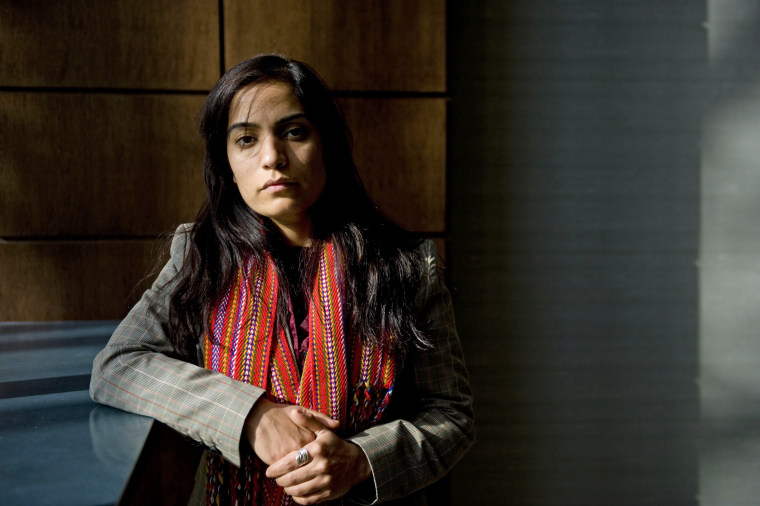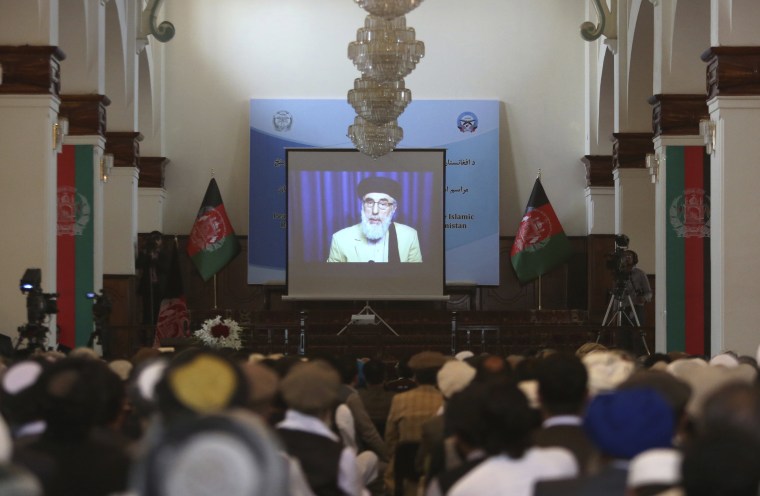Malalai Joya has been described as the "Bravest Woman in Afghanistan" for standing up to the very warlords who are being brought in the cold by her U.S.-backed government.
American bombs began raining down on Afghanistan 15 years ago Friday, marking the start of a U.S.-led operation to topple the Taliban which had sheltered 9/11 mastermind Osama bin Laden.
Freed of the group's ultra-conservative version of Islam, hopes ran high of a new and prosperous era as Afghanistan began receiving billions in aid dollars. But things have not turned out as planned.
Afghanistan remains one of the world’s poorest and most corrupt nations. The Taliban controls more territory than at any time since it was unseated and the civilian death toll in the violence has hit record highs.

Joya is a veteran anti-warlord campaigner who believes the government is embracing precisely the people who helped bring Afghanistan to its knees after the Soviet Union occupation ended in 1989.
She cited the September peace deal with “The Butcher of Kabul” Gulbuddin Hekmatyar — a fundamentalist warlord infamous for his savagery even in a country all too used to brutality.
The agreement was a betrayal and “signals more horror and bloodshed,” she told NBC News from Kabul, where she lives in hiding. “Gulbuddin is a devious rascal that has always brought sorrow and bloodshed, and it cannot be that he has become an angel of peace and kindness toward the end of his life."
Hekmatyar got significant aid from the U.S. to fight the Soviets, but is accused of killing or wounding thousands when his troops fired on Kabul during the civil wars of the 1990s.

And despite his later inclusion on the State Department's Specially Designated Global Terrorist list, Secretary of State John Kerry called September's deal a "model" for a possible pact with the Taliban. Sayed Ahmad Gilani, head of the Afghan government's High Peace Council, hailed it as "the beginning of a permanent peace in our country."
Joya rejects this, saying the "disastrous" pact was being praised by people "who have no idea."
The native of Farah Province has spent much of her life battling the influence of fighters like Hekmatyar, as well as Vice President Rashid Dostum and Second Chief Executive Mohammad Mohaqiq have also faced accusations of rights abuses.
The United States has "replaced the barbaric regime of the fundamentalist Taliban with the fundamentalist terrorist warlords who have bloody hands," Joya said.
"The consequences of this 15 years of occupation was more bloodshed, more human rights violations and women’s rights violations, more massacres. In fact, the terrorists are empowered."
Her campaign made her a celebrity in Afghanistan and propelled her into parliament in 2005. But it has also put her in grave danger and she says she has faced numerous attempts on her life.
Like millions of fellow Afghans, Joya allowed herself to hope the 2001 invasion would help rid her country of warlords who had ravaged her country, paved the way for the Taliban to take over in 1996 and driven millions into exile.
“Many warlords were brought into government, where they continued their abuses, maintained private militias, and had links to narcotics, smuggling and criminal networks.”
But the militia leaders' influence lives on and has seriously hindered Afghanistan’s development, according to Joya and others.
The Special Inspector General for Afghanistan Reconstruction (SIGAR), a U.S. government watchdog, last month criticized America's alliances with warlords and said many of them "committed war crimes and grave human rights abuses against fellow Afghans."
“Many warlords were brought into government, where they continued their abuses, maintained private militias, and had links to narcotics, smuggling and criminal networks,” according to SIGAR's list of lessons learned from the U.S. invasion. “U.S. partnerships with such individuals gave the Afghan population the impression the United States tolerated corruption and other abuses, seriously undercutting U.S. credibility.”
Joya, who was a teenager living in a refugee camp in Pakistan in 2001, was among the millions of refugees who returned to rebuild their lives and their country.
In 2003, she electrified her countrymen and women when she stood up at the country’s Loya Jirga — a meeting of notables convened to help lay the groundwork for the new, post-Taliban Afghanistan.
She shouted up to the chairman presiding the meeting — which in itself was extraordinary. A woman’s voice heard in a public space is a rare thing nowadays in Afghanistan but in the days immediately following the Taliban's ouster it was practically unheard of.
“Why would you allow criminals to be present at this Loya Jirga? Warlords are responsible for our country’s situation,” she said as some of the members clapped and other remained stony faced — her outburst clearly caused grave offense.
“They oppress women and have ruined our country. They should be prosecuted. They might be forgiven by the Afghan people, but not by history.”
The meeting erupted in jeers and shouting. Her criticism of the militiamen, many of whom fought the Soviet invasion and then turned on each other with little regard to civilian suffering, was considered so offensive that she was thrown out.
Clearly Joya’s criticism resonated and she went on to win a seat in parliament a few years later — from where she was suspended after she compared parliament to an animal stable.
But Joya’s words in 2003 were prophetic. With violence on the rise and the Taliban apparently on the ascendant, she places the blame on the U.S. and its allies
“The consequences of this 15 years of occupation was more bloodshed, more human rights violations and women’s rights violations, more massacres. In fact, the terrorists are empowered,” she said. “They pushed us from the frying pan into the fire."
